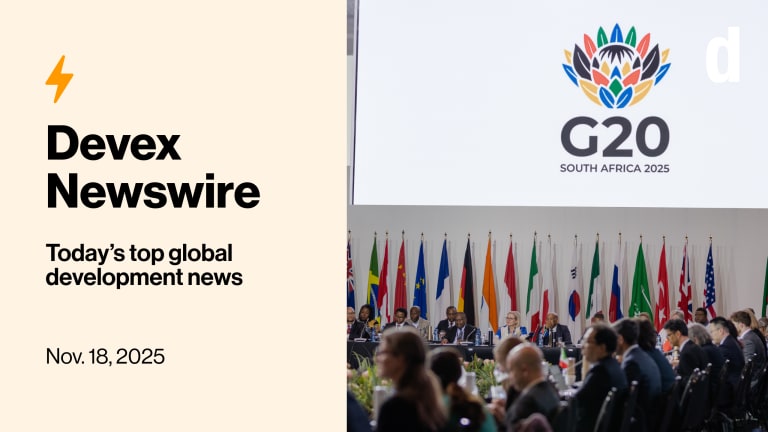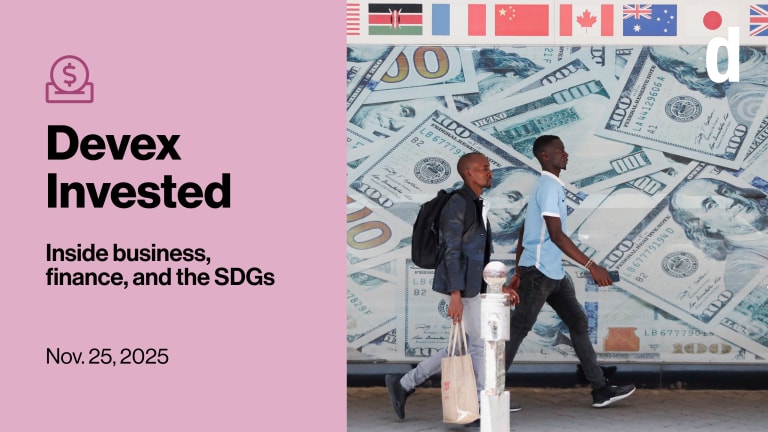
With a sigh of relief, negotiators concluded four days of discussion at the third International Conference on Financing for Development in Addis Ababa, Ethiopia. Under stormy skies, and among even more stormy confrontations in the negotiation room, a new Addis Ababa Action Agenda was born. But what does it mean for the SDG summit in September, and beyond?
Negotiations on the FFD communique were reportedly very difficult, with breakdowns of trust on all sides. Divisions emerged around two big questions: Who makes key decisions on global development policy, and who pays for the sustainable development goals?
Read our coverage of the #Fin4Dev conference:
► The future of development finance: Live from Addis
► For #FFD3 success after Addis, the devil is in the data
► What's needed from Addis: 'A mandate to do more and to do better'
On the first, the status of the U.N. tax committee dominated the summit’s negotiations. Expending political capital on a tax committee may sound absurd to those outside the summit bubble. But this was a totemic issue. The key question was whether discussions on tax cooperation should take place in the United Nations — where every country has an equal say — or the Organization for Economic Cooperation and Development, a rich-country club. OECD countries fought hard to retain control, suggesting they are not yet prepared to give developing countries an equal voice in global decision-making.
On the second question — who pays — the logic of the Millennium Development Goals era was clear. Countries unable to fund the goals domestically should be supported by aid and debt relief. This was a remarkably successful model, with aid levels increasing generally and to MDG sectors.
Negotiators in the SDG era sought to break up this consensus, placing a greater financial burden on developing country governments and the private sector. While this is to some extent a necessary shift, Overseas Development Institute analysis has shown that it should not go too far. Most low-income countries have little hope of funding even the basic tenets of the SDG agenda, such as social protection, universal health coverage and education, even if revenue collection improves. And in these sectors, the private sector is not well-placed to fill the gap.
So aid is still important, and who provides aid and where they spend it still send an important signal about the commitment of rich countries to the SDG agenda. On this basis, the lack of clear financing commitments in Addis does not augur well for September’s SDG summit.
This does not mean that the Addis summit was a failure. On some key issues, Addis marked an important shift in emphasis. Three key areas stand out.
First, the new social compact. The action agenda contained remarkably strong language on the need to provide social protection systems and measures for all, particularly the poorest and most marginalized, in line with proposals from ODI and others. The need to provide high-quality public services for all was also highlighted, with “strong international support” and “coherent funding modalities to mobilize additional resources” promised. While there was a lack of specifics on how these warm words would be taken forward, this language provides a good springboard for action.
Second, data. Addis marked a shift in the data revolution conversation from talk to action. A packed side event saw 200 people assemble early in the morning to talk data. Speakers including U.S. Treasury Sec. Jack Lew, the CEO of the Children’s Investment Fund Foundation, ministers from Kenya, Ireland, Senegal, and Italy, and representatives from Orange and MasterCard, all committed to a data revolution. They promised specific actions to improve the quality, accessibility and use of data, and to working together in a Global Partnership for Sustainable Development Data to maintain the political momentum, make investments and come together to solve data problems.
And finally, on tax. While the lack of agreement on a new U.N. tax committee was disappointing, there was strong language in the action agenda on tax, and a new Addis Tax Initiative will support countries committed to improving tax revenues, including by auditing multinational corporations. The U.K. Department for International Development is already piloting this type of project in Ghana, aiming to help the country turn illicit flows into revenues flowing into the treasury.
But such reforms will take time, and the lack of new financing commitments in the short term is going to leave developing countries with some hard choices come September. Should they attempt to implement all of the SDGs, but rely on domestic resources and the private sector to provide the bulk of the financing? This brings risks too, and may not be an option for some of the poorer countries who still struggle to access private flows. Should they issue more sovereign bonds, with associated debt risks?
Funding from multilateral development banks can provide a good option for those in the “missing middle” of countries whose official development assistance falls faster than domestic resources can increase to fill the gap. The MDBs committed $400 billion of financing for the SDGs, but this is only a small increase on current financing, and in practice, some countries are voting with their feet and opting for more expensive financing options rather than accepting MDB conditions.
These are not easy choices. Countries will have to think long and hard about how to implement the ambitious SDG agenda without compromising the principles of good financial management. In reality, some may not choose to go that far, accepting instead only partial implementation of the SDG agenda.
The warm words of the A4, as the Addis agenda is becoming known, provide a helpful framework for action. But unless donors make more concrete commitments, and show that the A4 is worth the paper it is written on, prospects for the SDG declaration may be undermined before the ink is even dry.
Missed major #Fin4Dev pledges and developments at the #FFD3 conference in Addis? Read the highlights from each day and reactions from civil society on major developments in our running blog.








